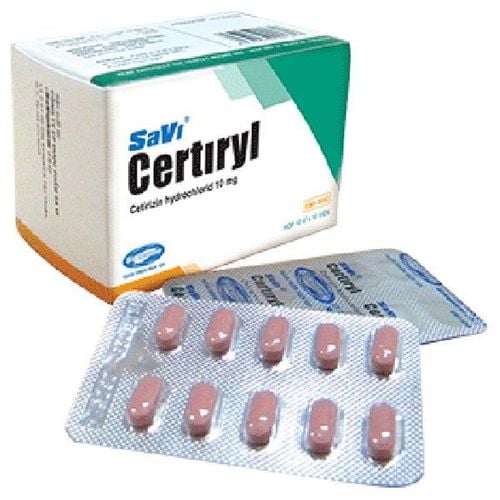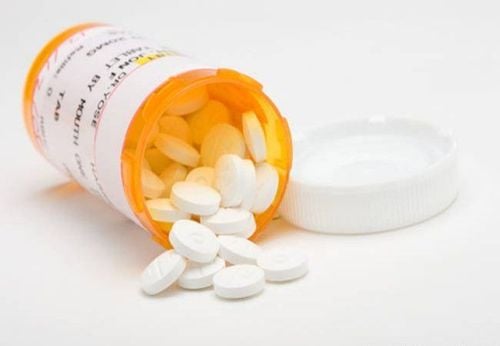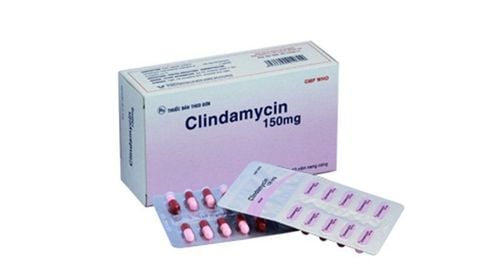This is an automatically translated article.
Drug Tnpbetasone with the main ingredient is Betamethasone belonging to the group of anti-allergic drugs. The drug is prescribed by a doctor for use in cases of hypersensitivity. Find out information about uses and doses to help patients improve treatment effectiveness and avoid unwanted side effects.
1. What is Tnpbetasone?
What is Tnpbetasone? Tnpbetasone drug with the main ingredient is Betamethasone belongs to the group of anti-allergic drugs and is indicated for use in cases of hypersensitivity.
Tnpbetasone is prepared in the form of hard capsules, packed in boxes of 10 blisters x 10 tablets; Bottles of 200 tablets and bottles of 500 tablets.
2. Indications and contraindications to the use of Tnpbetasone
2.1.Indications for Tnpbetasone What are the effects? Tnpbetasone is indicated in the following cases:
Indicated for the treatment of patients with complicated respiratory diseases, skin and eye allergies, inflammatory eye disorders. Indicated for treatment in patients requiring additional systemic corticosteroid therapy. 2.2. Contraindications Contraindicated to use Tnpbetasone in the following cases:
Patients with a history of hypersensitivity to one or any component of Tnpbetasone Preterm infants, infants, children under 6 years of age The patient is taking a monoamine oxidase (MAO) inhibitor. People with systemic fungal infections. Patients with gastric and duodenal ulcers. Narrow angle glaucoma. Patients with prostate enlargement, bladder neck obstruction. Contraindication to the use of Tnpbetasone is an absolute contraindication, that is, it is not for any reason that the contraindication can be arbitrarily changed to be usable.
3. Dosage and how to use Tnpbetasone
Tnpbetasone is made in the form of hard capsules, so patients need to take it orally. Absolutely do not arbitrarily change the dose of medication, avoid affecting health.
Dosage of Tnpbetasone is as follows:
Adults and children > 12 years old: Initial dose of Tnpbetasone: Use 1-2 tablets x 4 times/day. You should take the medicine after eating and at bedtime. Care should be taken not to use more than 8 tablets per day. Children from 6 to 12 years old: Recommended dosage of Tnpbetasone: Use 1⁄2 tablets x 3 times/day. If in case you need to supplement, it should be taken at bedtime. Care should be taken not to use more than 4 tablets per day. It should be noted: The dosage of Tnpbetasone above is for reference only, patients need to use the drug according to the prescription prescribed by the doctor. Do not use more drugs in the hope of speeding up the treatment of the disease.
4. Side effects when using the drug Tnpbetasone
During the use of Tnpbetasone, patients may experience some side effects with the following frequency:
Common side effects:
Causing sodium and water retention, increasing potassium excretion. Menstrual disorders, Cushing's syndrome, impaired glucose tolerance, growth retardation in children, patients with latent diabetes manifestations. Patients with muscle atrophy, weakness, osteoporosis, fractures, vertebral fractures, aseptic necrosis at the femoral head. Sleep chicken Dry mouth. Rare side effects:
Patients with peptic ulcer, gastric perforation, gastrointestinal bleeding, acute pancreatitis. Sleep disturbance, agitation. Glaucoma, cataracts. Rare side effects
In some cases when using Tnpbetasone, the patient appeared acne, bruises, slow healing, hirsutism. Dizziness, nausea. The above side effects may not be all the unwanted side effects during the use of Tnpbetasone. Therefore, if during use, the patient encounters any serious side effects, it is necessary to stop using the drug immediately and notify the doctor to avoid side effects affecting health.
5. Precautions and attention when using Tnpbetasone
Use caution when using Tnpbetasone in the following cases:
Extreme care should be taken when using Tnpbetasone in patients with congestive heart failure, recent myocardial infarction, hypertension, diabetes, glaucoma hypertension, epilepsy, hypothyroidism, liver failure, gastrointestinal ulcers, psychosis, osteoporosis, renal failure. Children and adults are susceptible to unwanted side effects. In particular, with young children, corticosteroids can cause growth retardation. Physicians often contraindicate the use of corticosteroids in patients with acute bacterial infections that are not controlled by appropriate antibacterial chemotherapy. In fact, patients on corticosteroid therapy are also more susceptible to infections, and even the symptoms of these conditions may be masked. Patients with active TB disease or suspected latent TB should not use corticosteroids, except in very rare cases as adjuncts to treatment with anti-tuberculosis drugs. Accordingly, people with latent tuberculosis must be closely monitored by a doctor, and use chemoprophylaxis against tuberculosis, if in the case of prolonged use of the drug. The risk of chickenpox and severe shingles is increased in immunocompromised patients using systemic corticosteroids, so exposure to these diseases must be avoided. Patients who are not immune but have been exposed to chickenpox should be given passive immunity. The same precautions outlined above apply to measles. Do not administer live attenuated vaccines to patients receiving high-dose systemic corticosteroid therapy and for at least three months thereafter. In some cases, a dead vaccine or toxoid can be given, although the immune response may be reduced. When taking Tnpbetasone long-term, it is necessary to closely monitor the patient periodically. You may need to reduce your sodium intake and take calcium and potassium supplements. Tnpbetasone should be used with caution in cases of narrow-angle glaucoma, urinary retention, prostatic hyperplasia, and pyloric obstruction. The sedative effect of the active ingredient dexchlorpheniramine maleate may be increased with alcohol intake or when used concurrently with other sedative drugs. The drug Tnpbetasone can cause drowsiness, dizziness, affect neuropsychiatric. Therefore, people who drive and operate machinery need to be very careful. Use caution when using Tnpbetasone with the elderly, because they are susceptible to anti-acetylcholine side effects. When using Tnpbetasone for pregnant and lactating women, it is necessary to weigh the benefits and risks. In addition, use only when prescribed by a doctor. Infants whose mothers have been taking corticosteroids for a long time during pregnancy should be carefully monitored for signs of adrenal insufficiency. Store Tnpbetasone in a cool, dry place, away from direct light. In addition, patients need to keep Tnpbetasone out of reach of children and family pets, to prevent children from taking it by mistake. If the patient finds that Tnpbetasone has expired, is watery, or has a distorted shape, it must not be used. Consult the environmental company on how to break down the medicine.
When using drugs, patients need to inform the doctor about drugs, herbs, traditional medicines, traditional medicines, functional foods so that the doctor knows and considers the time, dose, drug interactions. undesirable to happen.
In summary, the drug Tnpbetasone has the main ingredient Betamethasone which belongs to the group of anti-allergic drugs. The drug is prescribed by a doctor for use in cases of hypersensitivity. When being prescribed by a doctor to use Tnpbetasone, patients need to carefully read the instructions and information about the drug, and at the same time strictly follow the instructions of the doctor, professional pharmacist. Never use Tnpbetasone on your own without consulting your doctor.
Please dial HOTLINE for more information or register for an appointment HERE. Download MyVinmec app to make appointments faster and to manage your bookings easily.













